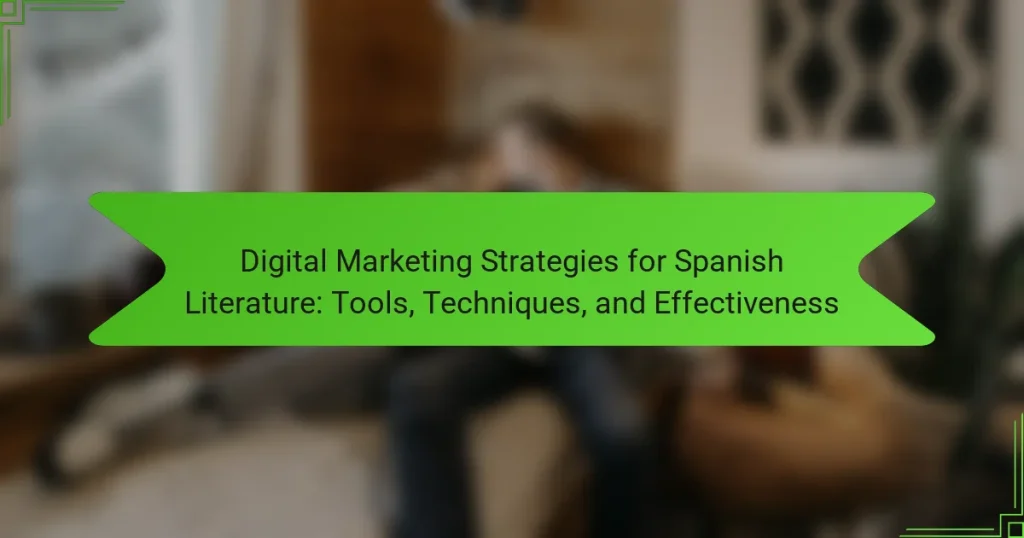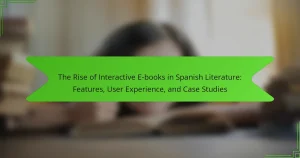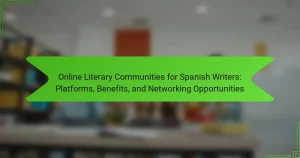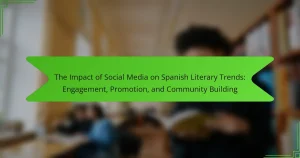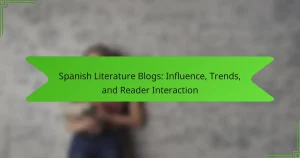Effective digital marketing strategies can significantly enhance the visibility of Spanish literature. Key approaches include social media marketing on platforms like Instagram, content creation through blogs and podcasts, and influencer partnerships. Utilizing data analytics improves audience engagement and tailors campaigns, while integrating local literary events fosters community connections. These strategies collectively address challenges such as language barriers and audience segmentation, making Spanish literature more accessible to diverse readers.
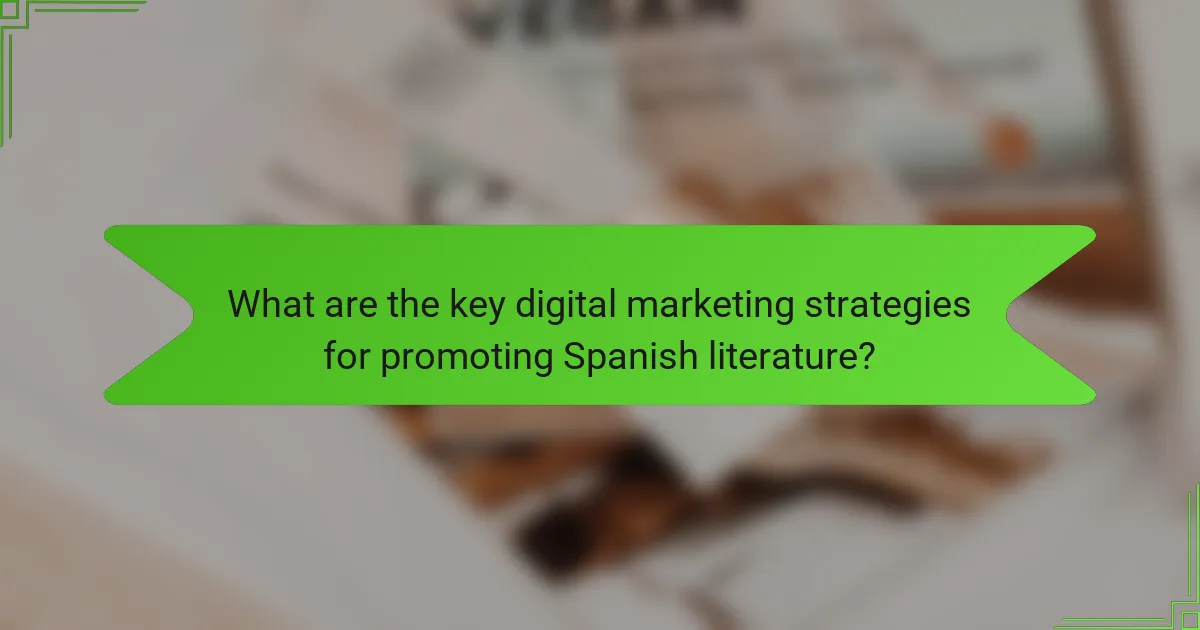
What are the key digital marketing strategies for promoting Spanish literature?
Digital marketing strategies for promoting Spanish literature include social media marketing, content marketing, influencer partnerships, and email marketing. These strategies effectively engage audiences and enhance visibility.
Social media marketing leverages platforms like Instagram and Twitter to share book excerpts, author interviews, and literary discussions, attracting a diverse readership. Content marketing focuses on creating blogs, podcasts, and videos that explore themes in Spanish literature, fostering deeper connections with potential readers.
Influencer partnerships involve collaborating with literary influencers to reach niche audiences, increasing credibility and engagement. Email marketing allows for personalized communication, offering book recommendations, event invitations, and exclusive content to subscribers, enhancing reader loyalty.
These strategies collectively contribute to a robust digital presence, making Spanish literature more accessible and appealing to a global audience.
How does content marketing enhance the visibility of Spanish literary works?
Content marketing significantly enhances the visibility of Spanish literary works by utilizing targeted digital strategies. These strategies include social media promotion, search engine optimization, and content creation that resonates with specific audiences.
Effective use of social media platforms allows authors and publishers to engage directly with readers, fostering community and interest. Search engine optimization ensures that Spanish literary works appear prominently in search results, increasing discoverability. Additionally, creating high-quality, relevant content related to Spanish literature can attract more readers and drive traffic to websites.
As a result, the visibility of these works improves, leading to higher sales and broader recognition in both local and global markets.
Which social media platforms are most effective for engaging Spanish literature audiences?
Instagram and Facebook are the most effective social media platforms for engaging Spanish literature audiences. Instagram’s visual nature attracts younger readers, while Facebook’s groups foster community discussions.
Twitter also plays a role, allowing authors and readers to connect through hashtags related to Spanish literature. TikTok is emerging as a platform where short videos can spark interest in literary works, particularly among Gen Z.
Utilizing these platforms can enhance visibility and engagement for content related to Spanish literature.
What role does SEO play in the digital marketing of Spanish literature?
SEO enhances the digital marketing of Spanish literature by improving visibility and engagement. Effective SEO strategies increase organic traffic to websites featuring Spanish literary works, making them more accessible to readers. Optimizing content with relevant keywords, metadata, and quality backlinks can significantly boost search rankings. As a result, authors and publishers can reach wider audiences, fostering greater appreciation and sales of Spanish literature.
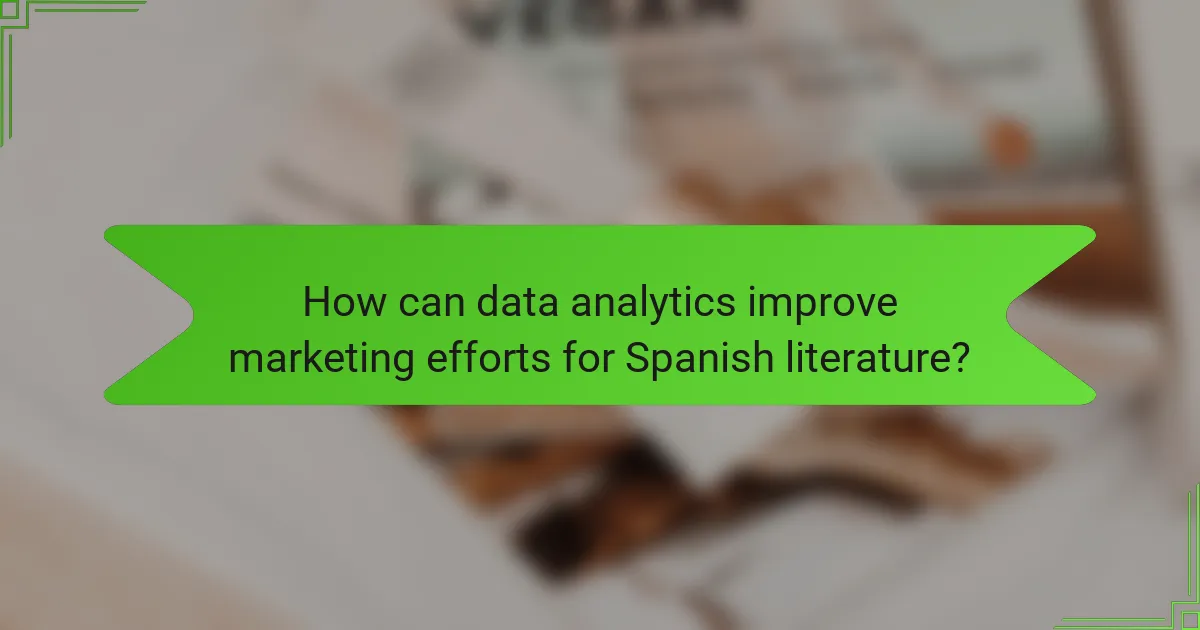
How can data analytics improve marketing efforts for Spanish literature?
Data analytics can significantly enhance marketing efforts for Spanish literature by providing insights into audience preferences and behaviors. By analyzing data, marketers can tailor campaigns to resonate with specific demographics, improving engagement.
Tools like Google Analytics enable tracking of user interactions on websites, while social media analytics help identify trending topics within Spanish literature. Techniques such as A/B testing can refine messaging and visuals based on audience response.
The effectiveness of these strategies is evident in increased online sales and community engagement. Data-driven decisions lead to targeted promotions, maximizing reach and impact. Overall, leveraging data analytics fosters a deeper connection between Spanish literature and its audience.
What metrics should be tracked to measure the effectiveness of digital marketing campaigns?
To measure the effectiveness of digital marketing campaigns, track key metrics such as conversion rates, return on investment (ROI), click-through rates (CTR), customer acquisition cost (CAC), and engagement levels. These metrics provide insights into performance and areas for improvement.
| Metric | Description |
|—————————-|——————————————————-|
| Conversion Rate | Percentage of users completing a desired action |
| Return on Investment (ROI) | Revenue generated relative to marketing costs |
| Click-Through Rate (CTR) | Ratio of users clicking on ads to total impressions |
| Customer Acquisition Cost (CAC) | Cost associated with acquiring a new customer |
| Engagement Levels | Interaction rates across platforms (likes, shares) |
How can audience segmentation enhance targeting for Spanish literature promotions?
Audience segmentation enhances targeting for Spanish literature promotions by allowing marketers to tailor messages to specific groups. This approach increases engagement and conversion rates. For instance, identifying demographics such as age, reading preferences, and cultural backgrounds enables more relevant content delivery. As a result, promotions resonate better with potential readers, leading to higher sales and increased brand loyalty.
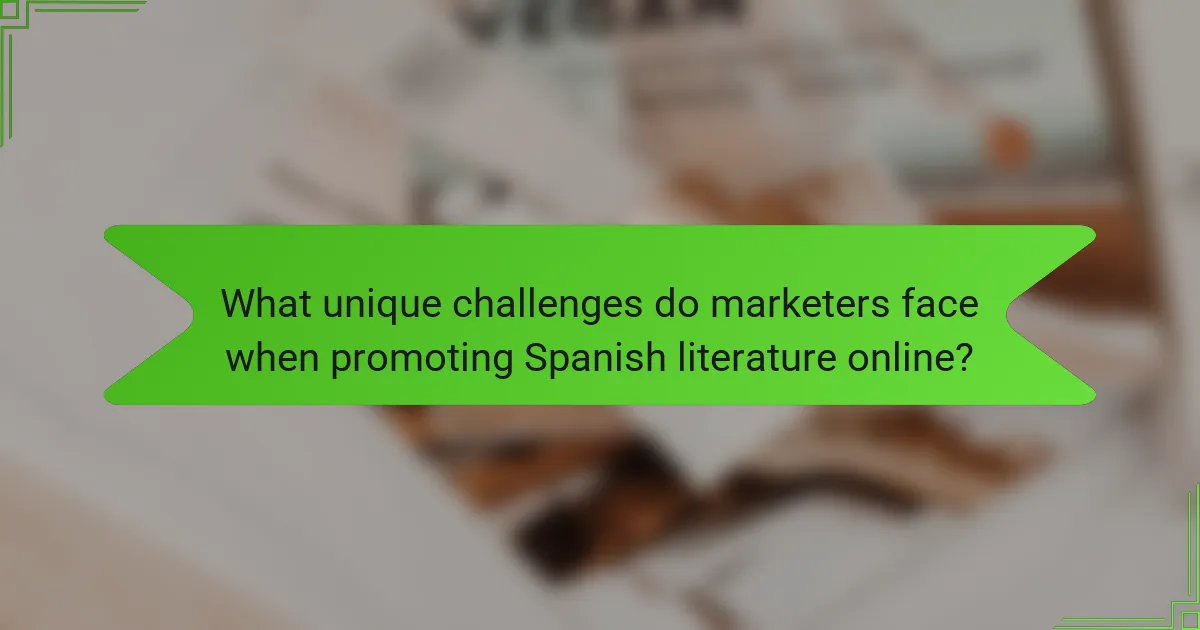
What unique challenges do marketers face when promoting Spanish literature online?
Marketers face unique challenges promoting Spanish literature online due to language barriers, cultural nuances, and audience segmentation. Effective digital marketing strategies must consider diverse linguistic preferences and regional differences in literature consumption. Additionally, limited resources for targeted campaigns can hinder visibility. Engaging content that resonates with the target audience is essential for overcoming these obstacles.
How do cultural differences impact digital marketing strategies for Spanish literature?
Cultural differences significantly influence digital marketing strategies for Spanish literature by shaping audience preferences and communication styles. Understanding regional variations in language, values, and traditions enhances engagement and effectiveness.
For example, marketing campaigns must consider the diverse dialects within Spanish-speaking countries, tailoring content to resonate with local audiences. Additionally, cultural references and local customs can enhance relatability, making promotional materials more appealing.
As a result, successful digital marketing strategies for Spanish literature often incorporate localized content, culturally relevant imagery, and platforms popular in specific regions. This approach not only increases visibility but also fosters a deeper connection with readers.
What are the common misconceptions about marketing Spanish literature?
Common misconceptions about marketing Spanish literature include the belief that it only appeals to niche audiences, that it lacks digital engagement, and that traditional methods are sufficient. Many assume Spanish literature cannot compete with mainstream genres, overlooking its diverse readership. Furthermore, some think social media and digital tools are ineffective for this market, ignoring successful campaigns that utilize these platforms effectively. Lastly, there is a misconception that marketing strategies should remain static, while innovative approaches can significantly enhance visibility and engagement.
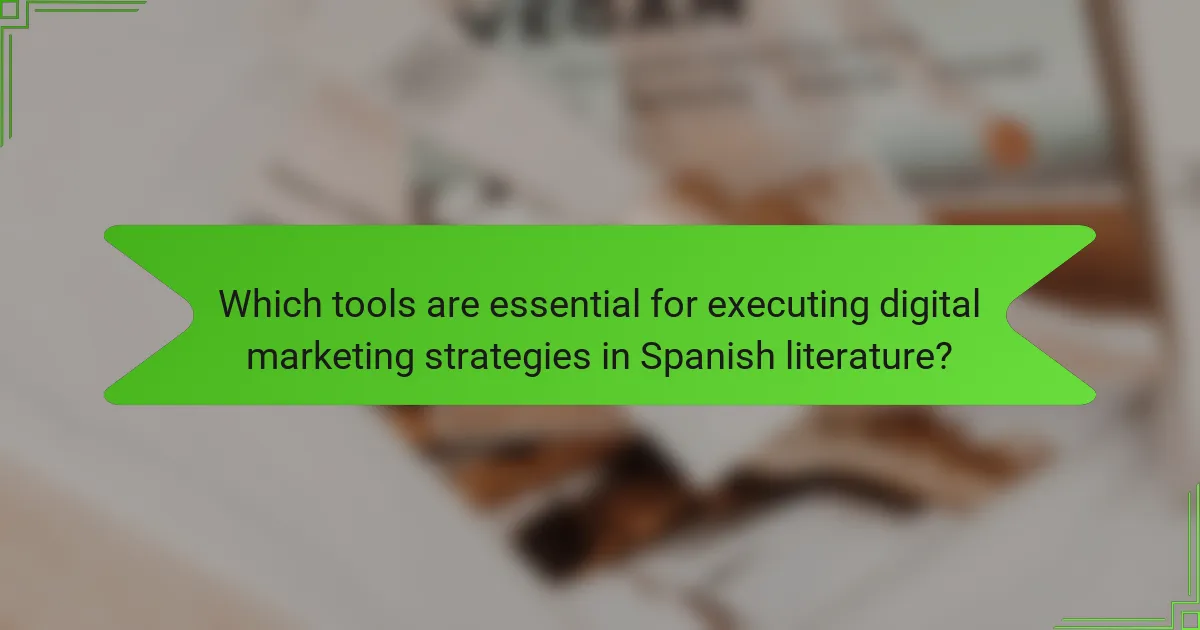
Which tools are essential for executing digital marketing strategies in Spanish literature?
Essential tools for executing digital marketing strategies in Spanish literature include social media platforms, content management systems, email marketing software, analytics tools, and SEO tools. These tools enhance audience engagement, track performance, and optimize content for better reach.
1. Social Media Platforms: Facilitate community building and content sharing.
2. Content Management Systems: Streamline content creation and publishing.
3. Email Marketing Software: Enable targeted communication and audience retention.
4. Analytics Tools: Provide insights on user behavior and campaign effectiveness.
5. SEO Tools: Improve visibility and search rankings for Spanish literature content.
What are the best content creation tools for Spanish literary marketing?
The best content creation tools for Spanish literary marketing include Canva, Hootsuite, Grammarly, and Mailchimp. These tools enhance visual content, manage social media, improve writing quality, and facilitate email marketing campaigns.
Canva offers templates for visually appealing graphics. Hootsuite streamlines social media scheduling and analytics. Grammarly ensures high-quality writing with language support for Spanish. Mailchimp provides effective email marketing solutions tailored for Spanish-speaking audiences.
How can automation tools streamline marketing processes for Spanish literature?
Automation tools can significantly streamline marketing processes for Spanish literature by enhancing efficiency and reach. These tools enable marketers to manage campaigns, analyze audience engagement, and automate repetitive tasks. For instance, content scheduling tools allow for timely social media posts, while analytics platforms provide insights into reader preferences. As a result, marketers can tailor their strategies to better resonate with their audience, ultimately increasing engagement and sales.
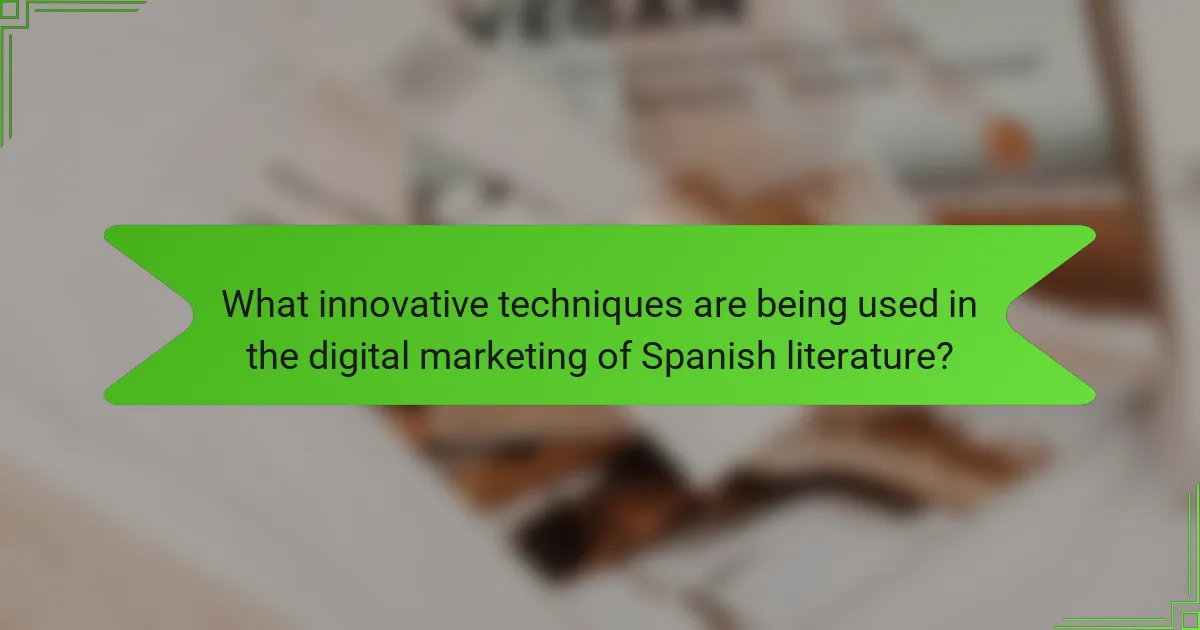
What innovative techniques are being used in the digital marketing of Spanish literature?
Innovative techniques in the digital marketing of Spanish literature include targeted social media campaigns, influencer collaborations, and interactive content. These strategies enhance engagement and broaden reach among diverse audiences. For example, using platforms like Instagram and TikTok allows authors to share visual storytelling, while podcasts can introduce literary discussions to new listeners. Additionally, data analytics tools help marketers fine-tune their strategies based on audience behavior and preferences, ensuring effectiveness.
How does influencer marketing impact the promotion of Spanish authors?
Influencer marketing significantly enhances the promotion of Spanish authors by increasing visibility and engagement. Influencers leverage their platforms to reach diverse audiences, effectively showcasing Spanish literature. This strategy fosters authentic connections between authors and readers, amplifying book recommendations and driving sales. Moreover, influencer partnerships often lead to collaborative content, such as interviews or live readings, further enriching the literary community. As a result, Spanish authors gain broader recognition and access to new markets, making influencer marketing a vital tool in their promotional strategies.
What emerging trends are shaping the future of digital marketing for Spanish literature?
Emerging trends shaping the future of digital marketing for Spanish literature include increased use of social media platforms, personalized content strategies, and data-driven decision-making. Social media is vital for engaging audiences and promoting authors. Personalized content enhances reader experiences by tailoring recommendations. Data analytics helps marketers understand consumer behavior, improving campaign effectiveness. These trends foster deeper connections between literature and its audience.
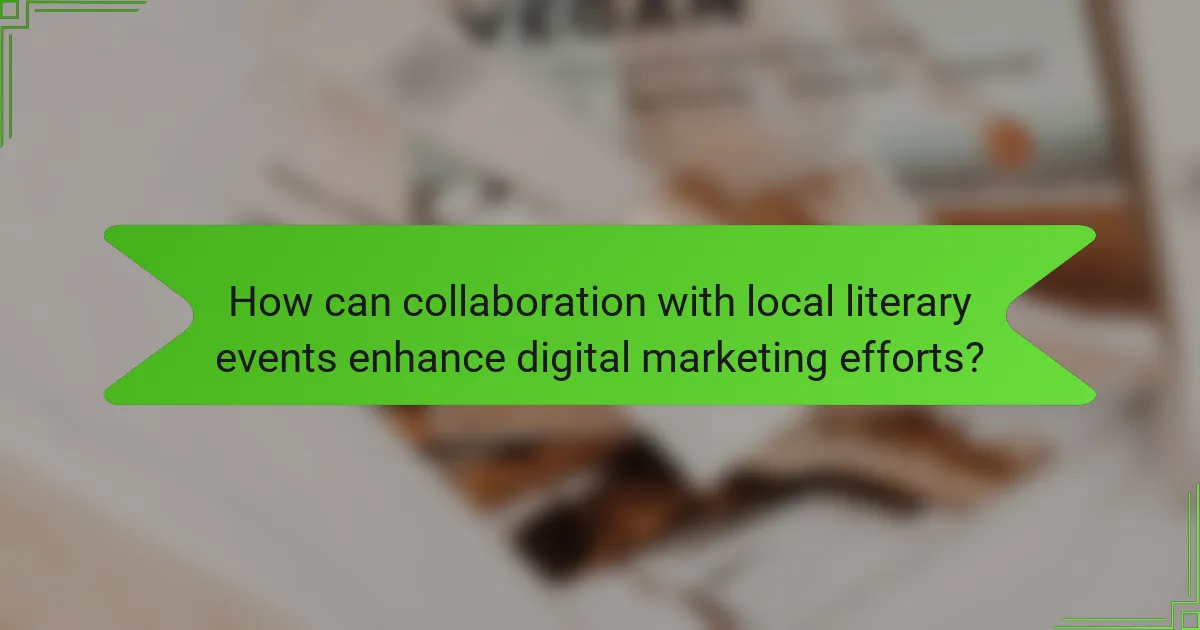
How can collaboration with local literary events enhance digital marketing efforts?
Collaboration with local literary events can significantly enhance digital marketing efforts by fostering community engagement and brand visibility. Participating in these events allows brands to connect with a targeted audience passionate about literature, generating authentic interactions.
Local literary events provide opportunities for content creation, such as live coverage, interviews, and social media engagement, which can boost online presence. Additionally, partnerships with authors or influencers at these events can amplify reach and credibility.
As a result, integrating local literary events into digital marketing strategies can lead to increased brand awareness, audience loyalty, and ultimately, higher conversion rates.
What types of partnerships are most beneficial for promoting Spanish literature?
Collaborative partnerships with educational institutions, cultural organizations, and digital platforms are most beneficial for promoting Spanish literature. These partnerships leverage resources, reach wider audiences, and enhance engagement through shared events and initiatives.
Educational institutions can facilitate workshops and literature courses, while cultural organizations can organize festivals and author readings. Digital platforms enhance visibility through social media campaigns and online book clubs, expanding access to diverse audiences.
Effective partnerships often result in increased readership and appreciation for Spanish literature, fostering a vibrant literary community.
How can authors leverage literary festivals for digital marketing?
Authors can leverage literary festivals for digital marketing by engaging directly with audiences and building brand visibility. These events provide a platform for networking, promoting new works, and enhancing online presence through social media interactions. Participating in panel discussions or workshops allows authors to showcase their expertise, attracting potential readers. Additionally, collecting email subscriptions during these festivals can help authors build a targeted audience for future marketing efforts. Overall, literary festivals serve as an effective tool for authors to connect with their audience and enhance their digital marketing strategies.
What are the best practices for integrating online and offline marketing strategies?
Integrating online and offline marketing strategies enhances reach and engagement. Best practices include creating a unified brand message, utilizing social media to promote offline events, and employing email marketing to drive in-store visits. Additionally, leveraging data analytics helps measure the effectiveness of both channels, ensuring resources are allocated efficiently. Engaging customers through personalized experiences across platforms can further strengthen brand loyalty.
What common mistakes should be avoided in digital marketing for Spanish literature?
Avoiding common mistakes in digital marketing for Spanish literature is crucial for success. One major error is neglecting cultural nuances, which can lead to miscommunication. Another mistake is failing to optimize content for Spanish-speaking audiences, including using appropriate keywords and SEO strategies. Ignoring social media engagement can also hinder visibility, as platforms are vital for reaching readers. Lastly, underestimating the importance of analytics can prevent marketers from understanding their audience effectively.
